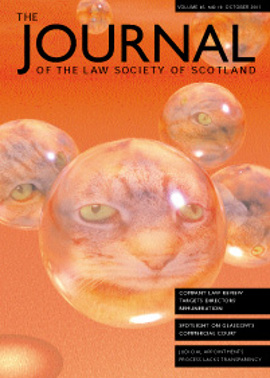Diversity – accepting the challenge
Dharmendra Kanani, Head of the Commission for Racial Equality in Scotland, interviews Law Society of Scotland Secretary and Chief Executive Douglas Mill on issues of diversity and in particular the Society’s position on the Race Relations Amendments Act and its obligations under the Leadership Challenge.
The amendments to the Race Relations Act 1976 obviously have significant implications for the Law Society for integrating racial equality into the heart of its activities. How challenging do you think it would be for the Law Society to meet its new obligations?
The Society is an Equal Opportunities employer. It has established and expanded its employment practices to deal with diversity issues and I think has achieved this first level target. I will be bringing to Council within the next month or so a proposed policy document dealing with an expansion of this commitment to the profession as a whole. At the moment the Solicitors Code of Conduct strictly prohibits discrimination on any diversity basis and I do not think that the profession will have much difficulty in accepting that their professional body should be pro-active in promoting good diversity practice. Lawyers observe the law and respect individual liberties and rights. I am prepared to accept any criticism that we are being excessively P.C., but I think our Council wants to be at the forefront of driving forward change and seeking to eliminate any discrimination that may exist within the legal system of Scotland.
What benefits do you think the Society’s decision to tackle race equality will bring to the legal profession as a whole – for new entrants, existing firms and their clients?
Scotland is becoming a multi-cultural society. Even in the last 20 years, gender and religious issues have become much less acute. I believe strongly that the Society and the profession can be proud of its record in these areas. Racial issues should be no different. In addition to being illegal, discrimination is not just stupid but bad business. I believe that there is a strong community of interest between lawyers and their clients on most issues and am convinced that forward-thinking firms will be happy to endorse diversity policies.
Particularly in light of the new legislation, what role do you see for partnership between the Society and other organisations to ensure that every lawyer working in Scotland has a thorough understanding of racial equality and its relevance in Scotland today?
The Society is delighted to work in partnership with the Commission for Racial Equality. We are looking at various projects such as the translation of our leaflets into ethnic minority languages and the promotion of seminars recognising the diversity dimension. “Best Practice for the Legal Profession” is being held in Edinburgh on 22nd October and in Glasgow on 15th November. This article is an example of the profile which we are keen to give the topic in the profession. We are keen to work in conjunction with any other organisation involved in the legal system in Scotland and indeed the universities to raise awareness of these issues. I am a believer that diversity issues require to be mainstreamed rather than sidelined and I would be opposed to teaching diversity as a discreet topic at university. It requires to be part of the philosophy and jurisprudence of all lawyers in Scotland. There is also however a danger in over-emphasising as this could build resistance.
Finally, as a leadership challenger you have committed the Society to being an organisation which makes a real difference to racial equality in Scotland. How will you know when you have achieved that goal?
It will be very difficult. We will do what we can to set some objective targets and milestones but it is quite tricky to measure real progress. The law can drive social change but lawyers must play their part and I feel that the Society must in turn give lawyers the means to make a real difference. I think cultural acceptance will be quick in this area and my personal hope is that we all look back, say in five years from now, and wonder why anyone could ever have been misguided enough to discriminate. I really do believe that former deep-seated religious differences, particularly in the West of Scotland where I come from, are now only marginal and I think the progress that has been made in gender equality in the profession over the last generation has been tremendous. These are models on which to build.
In this issue
- President’s report
- Modernising company law
- Framework established for collective redundancies
- Time to re-think conveyancing customs
- Crying freedom
- Diversity – accepting the challenge
- Expediting commercial resolutions
- D-Day approaches!
- Observations on remedy of interdict
- Dishonesty of clients – how do you spot it?
- The Professional Competence Course
- Book reviews






